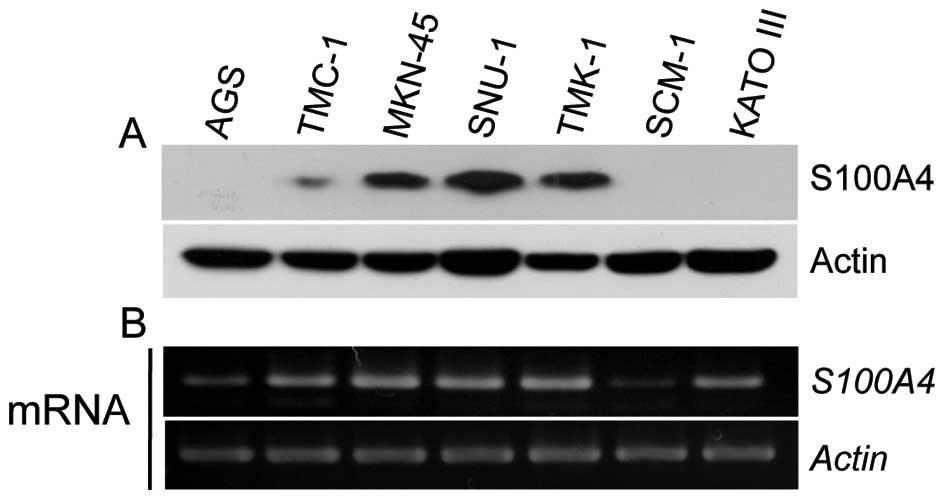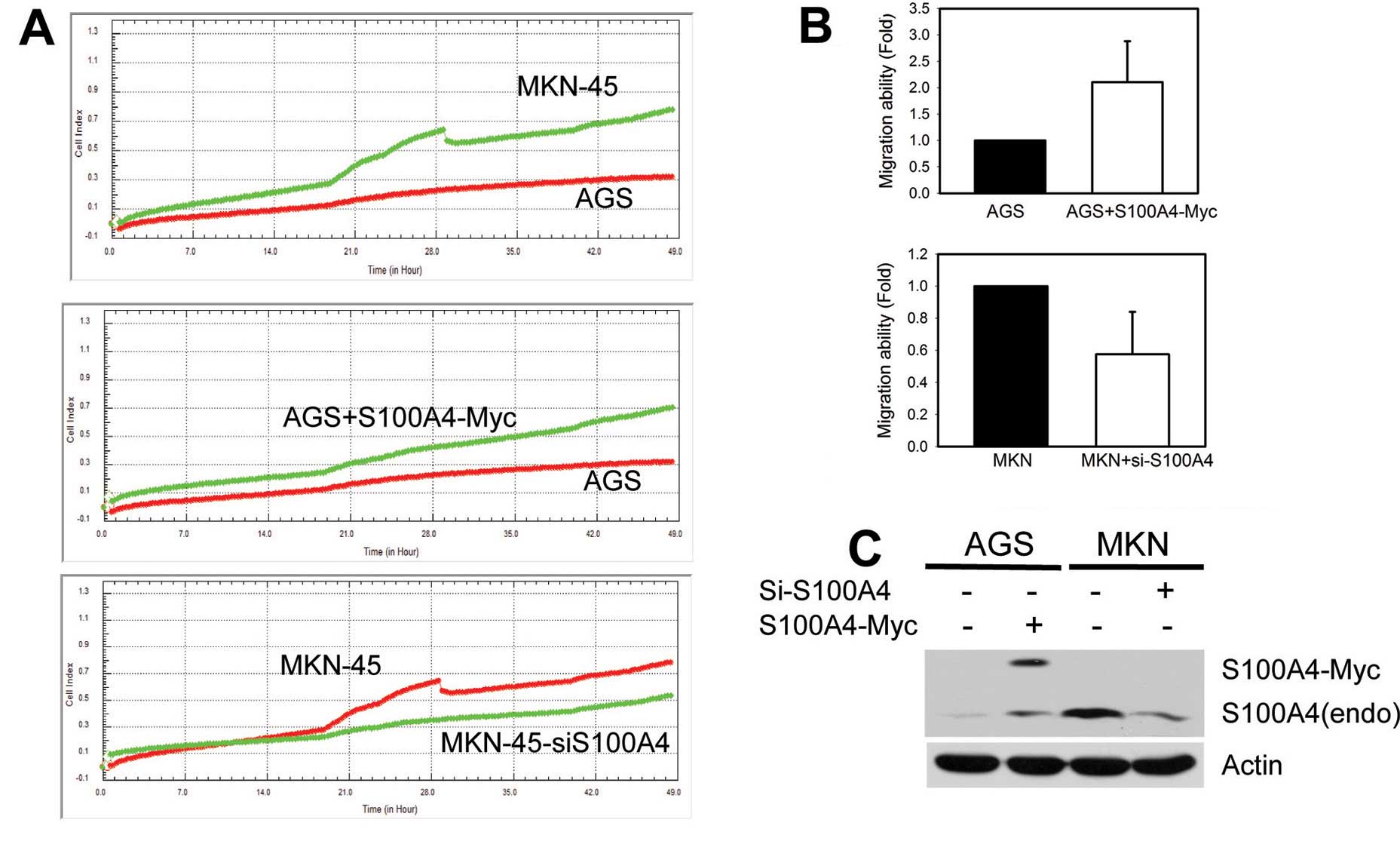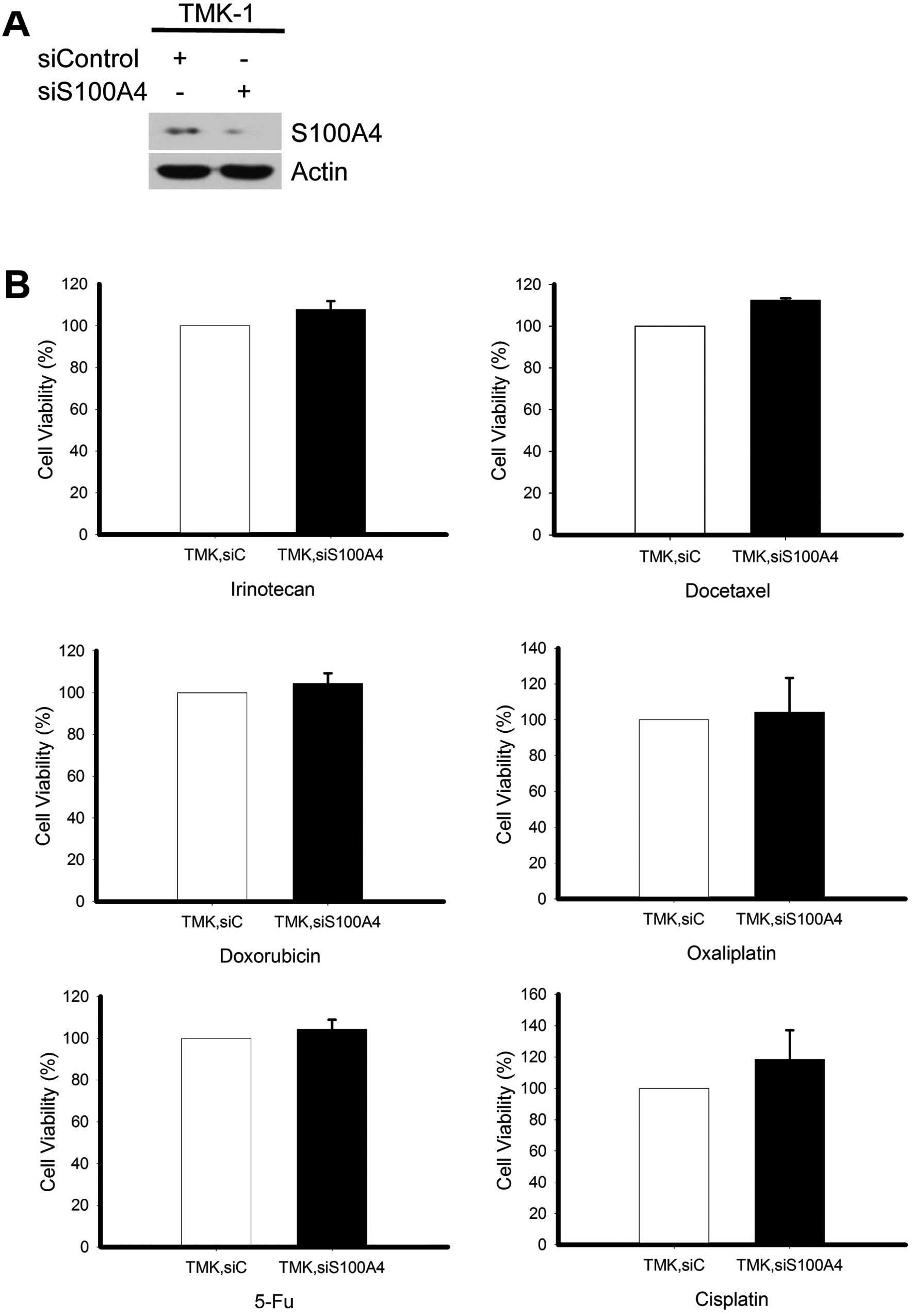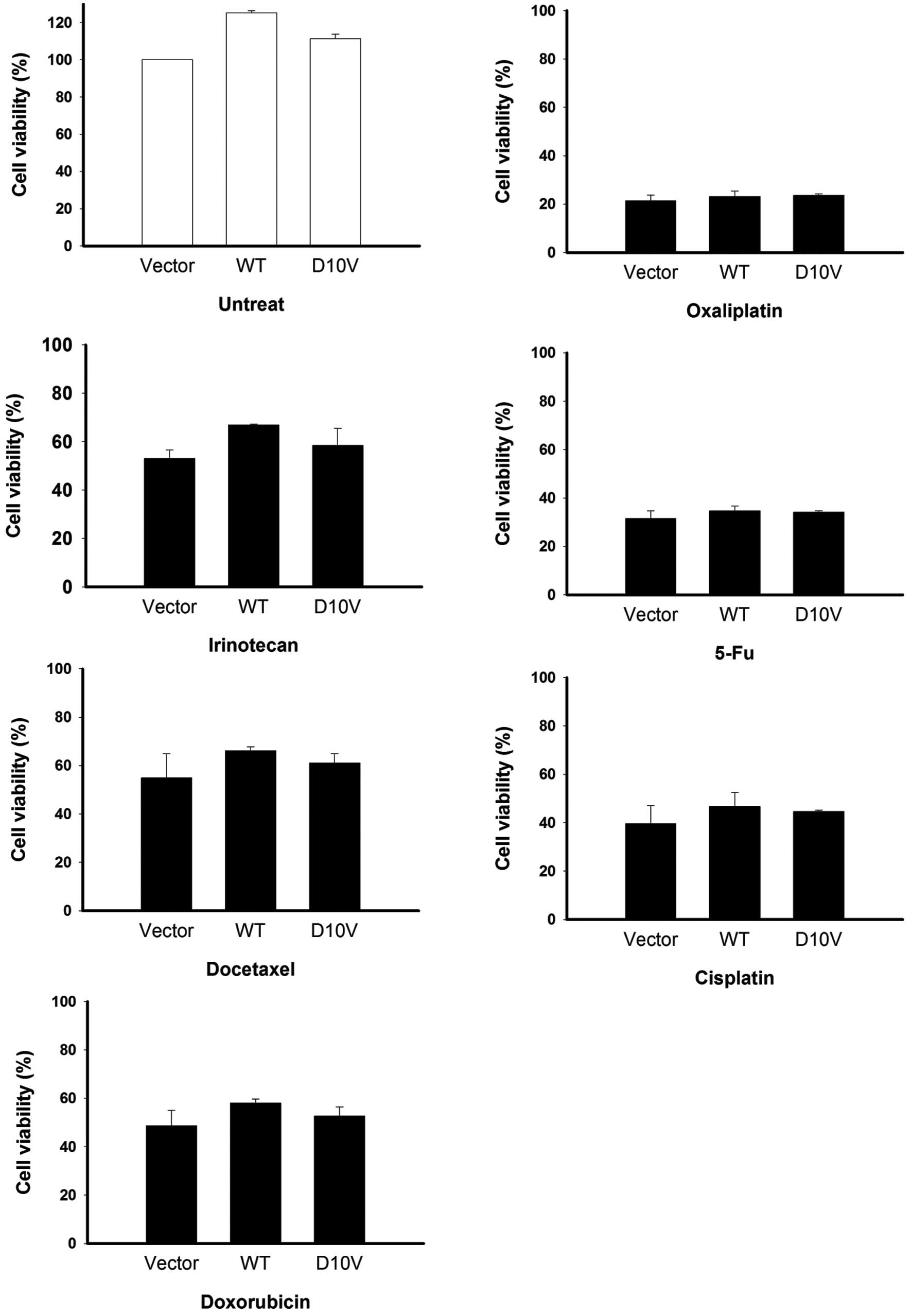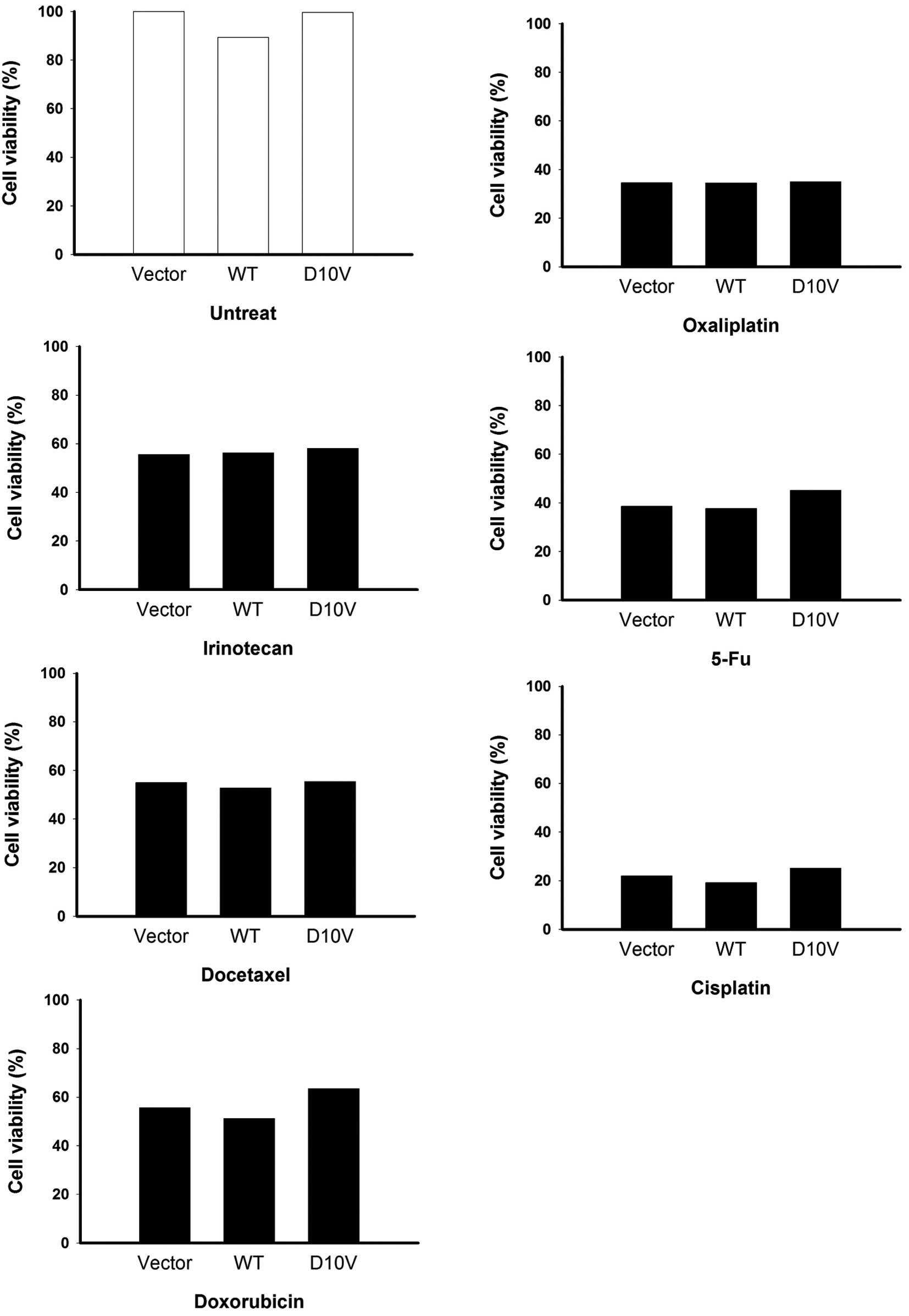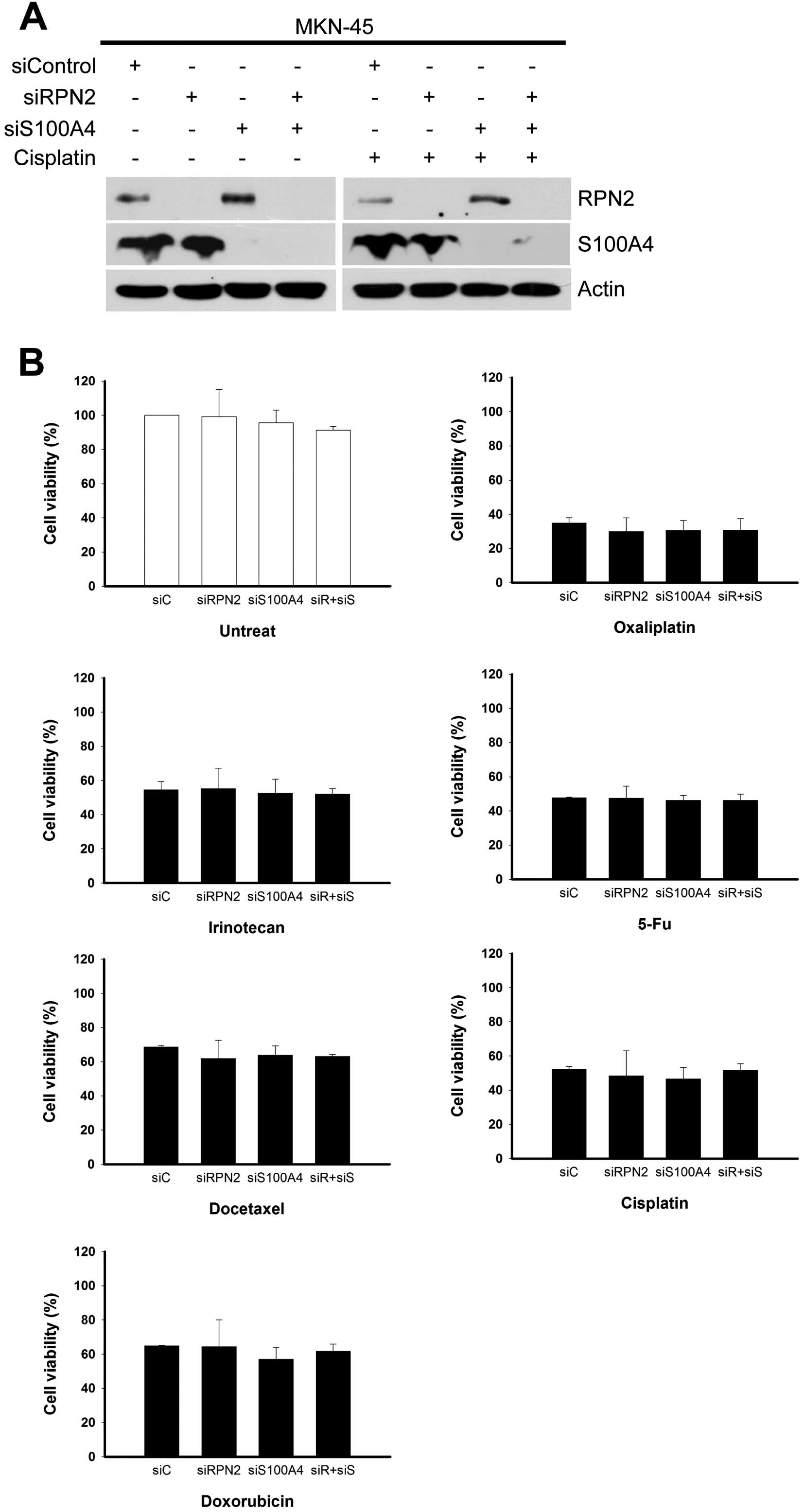|
1
|
Santamaria-Kisiel L, Rintala-Dempsey AC
and Shaw GS: Calcium-dependent and -independent interactions of the
S100 protein family. Biochem J. 396:201–214. 2006. View Article : Google Scholar : PubMed/NCBI
|
|
2
|
Fritz G, Botelho HM, Morozova-Roche LA and
Gomes CM: Natural and amyloid self-assembly of S100 proteins:
structural basis of functional diversity. FEBS J. 277:4578–4590.
2010. View Article : Google Scholar : PubMed/NCBI
|
|
3
|
Helfman DM, Kim EJ, Lukanidin E and
Grigorian M: The metastasis associated protein S100A4: role in
tumour progression and metastasis. Br J Cancer. 92:1955–1958. 2005.
View Article : Google Scholar : PubMed/NCBI
|
|
4
|
Boye K and Maelandsmo GM: S100A4 and
metastasis: a small actor playing many roles. Am J Pathol.
176:528–535. 2010. View Article : Google Scholar : PubMed/NCBI
|
|
5
|
Sekine H, Chen N, Sato K, Saiki Y, Yoshino
Y, Umetsu Y, Jin G, Nagase H, Gu Z, Fukushige S, Sunamura M and
Horii A: S100A4, frequently overexpressed in various human cancers,
accelerates cell motility in pancreatic cancer cells. Biochem
Biophys Res Commun. 429:214–219. 2012. View Article : Google Scholar
|
|
6
|
Ebralidze A, Tulchinsky E, Grigorian M,
Afanasyeva A, Senin V, Revazova E and Lukanidin E: Isolation and
characterization of a gene specifically expressed in different
metastatic cells and whose deduced gene product has a high degree
of homology to a Ca2+-binding protein family. Genes Dev.
3:1086–1093. 1989. View Article : Google Scholar
|
|
7
|
Grigorian M, Ambartsumian N, Lykkesfeldt
AE, Bastholm L, Elling F, Georgiev G and Lukanidin E: Effect of
mts1 (S100A4) expression on the progression of human breast cancer
cells. Int J Cancer. 67:831–841. 1996. View Article : Google Scholar : PubMed/NCBI
|
|
8
|
Yonemura Y, Endou Y, Kimura K, Fushida S,
Bandou E, Taniguchi K, Kinoshita K, Ninomiya I, Sugiyama K,
Heizmann CW, Schafer BW and Sasaki T: Inverse expression of S100A4
and E-cadherin is associated with metastatic potential in gastric
cancer. Clin Cancer Res. 6:4234–4242. 2000.PubMed/NCBI
|
|
9
|
Davies BR, Davies MP, Gibbs FE,
Barraclough R and Rudland PS: Induction of the metastatic phenotype
by transfection of a benign rat mammary epithelial cell line with
the gene for p9Ka, a rat calcium-binding protein, but not with the
oncogene EJ-ras-1. Oncogene. 8:999–1008. 1993.PubMed/NCBI
|
|
10
|
Takenaga K, Nakamura Y and Sakiyama S:
Expression of antisense RNA to S100A4 gene encoding an S100-related
calcium-binding protein suppresses metastatic potential of
high-metastatic Lewis lung carcinoma cells. Oncogene. 14:331–337.
1997. View Article : Google Scholar
|
|
11
|
Takenaga K, Nakanishi H, Wada K, Suzuki M,
Matsuzaki O, Matsuura A and Endo H: Increased expression of S100A4,
a metastasis-associated gene, in human colorectal adenocarcinomas.
Clin Cancer Res. 3:2309–2316. 1997.PubMed/NCBI
|
|
12
|
Ambartsumian NS, Grigorian MS, Larsen IF,
Karlstrom O, Sidenius N, Rygaard J, Georgiev G and Lukanidin E:
Metastasis of mammary carcinomas in GRS/A hybrid mice transgenic
for the mts1 gene. Oncogene. 13:1621–1630. 1996.PubMed/NCBI
|
|
13
|
Davies MP, Rudland PS, Robertson L, Parry
EW, Jolicoeur P and Barraclough R: Expression of the
calcium-binding protein S100A4 (p9Ka) in MMTV-neu transgenic mice
induces metastasis of mammary tumours. Oncogene. 13:1631–1637.
1996.PubMed/NCBI
|
|
14
|
Maelandsmo GM, Hovig E, Skrede M,
Engebraaten O, Florenes VA, Myklebost O, Grigorian M, Lukanidin E,
Scanlon KJ and Fodstad O: Reversal of the in vivo metastatic
phenotype of human tumor cells by an anti-CAPL (mts1) ribozyme.
Cancer Res. 56:5490–5498. 1996.PubMed/NCBI
|
|
15
|
Saleem M, Adhami VM, Ahmad N, Gupta S and
Mukhtar H: Prognostic significance of metastasis-associated protein
S100A4 (Mts1) in prostate cancer progression and chemoprevention
regimens in an autochthonous mouse model. Clin Cancer Res.
11:147–153. 2005.
|
|
16
|
Lee WY, Su WC, Lin PW, Guo HR, Chang TW
and Chen HH: Expression of S100A4 and Met: potential predictors for
metastasis and survival in early-stage breast cancer. Oncology.
66:429–438. 2004. View Article : Google Scholar
|
|
17
|
Boye K, Nesland JM, Sandstad B, Maelandsmo
GM and Flatmark K: Nuclear S100A4 is a novel prognostic marker in
colorectal cancer. Eur J Cancer. 46:2919–2925. 2010. View Article : Google Scholar : PubMed/NCBI
|
|
18
|
Mishra SK, Siddique HR and Saleem M:
S100A4 calcium-binding protein is key player in tumor progression
and metastasis: preclinical and clinical evidence. Cancer
Metastasis Rev. 31:163–172. 2012. View Article : Google Scholar : PubMed/NCBI
|
|
19
|
Wang YY, Ye ZY, Zhao ZS, Tao HQ and Chu
YQ: High-level expression of S100A4 correlates with lymph node
metastasis and poor prognosis in patients with gastric cancer. Ann
Surg Oncol. 17:89–97. 2010. View Article : Google Scholar : PubMed/NCBI
|
|
20
|
Kim EJ and Helfman DM: Characterization of
the metastasis-associated protein, S100A4. Roles of calcium binding
and dimerization in cellular localization and interaction with
myosin. J Biol Chem. 278:30063–30073. 2003. View Article : Google Scholar : PubMed/NCBI
|
|
21
|
Saleem M, Kweon MH, Johnson JJ, Adhami VM,
Elcheva I, Khan N, Bin Hafeez B, Bhat KM, Sarfaraz S, Reagan-Shaw
S, Spiegelman VS, Setaluri V and Mukhtar H: S100A4 accelerates
tumorigenesis and invasion of human prostate cancer through the
transcriptional regulation of matrix metalloproteinase 9. Proc Natl
Acad Sci USA. 103:14825–14830. 2006. View Article : Google Scholar : PubMed/NCBI
|
|
22
|
Wang L, Wang X, Liang Y, Diao X and Chen
Q: S100A4 promotes invasion and angiogenesis in breast cancer
MDA-MB-231 cells by upregulating matrix metalloproteinase-13. Acta
Biochim Pol. 59:593–598. 2012.PubMed/NCBI
|
|
23
|
Zhang HY, Zheng XZ, Wang XH, Xuan XY, Wang
F and Li SS: S100A4 mediated cell invasion and metastasis of
esophageal squamous cell carcinoma via the regulation of MMP-2 and
E-cadherin activity. Mol Biol Rep. 39:199–208. 2012. View Article : Google Scholar : PubMed/NCBI
|
|
24
|
Lo JF, Yu CC, Chiou SH, Huang CY, Jan CI,
Lin SC, Liu CJ, Hu WY and Yu YH: The epithelial-mesenchymal
transition mediator S100A4 maintains cancer-initiating cells in
head and neck cancers. Cancer Res. 71:1912–1923. 2011. View Article : Google Scholar : PubMed/NCBI
|
|
25
|
Bettum IJ, Vasiliauskaite K, Nygaard V,
Clancy T, Pettersen SJ, Tenstad E, Maelandsmo GM and Prasmickaite
L: Metastasis-associated protein S100A4 induces a network of
inflammatory cytokines that activate stromal cells to acquire
pro-tumorigenic properties. Cancer Lett. 344:28–39. 2014.
View Article : Google Scholar
|
|
26
|
Hansen MT, Forst B, Cremers N, Quagliata
L, Ambartsumian N, Grum-Schwensen B, Klingelhofer J, Abdul-Al A,
Herrmann P, Osterland M, Stein U, Nielsen GH, Scherer PE, Lukanidin
E, Sleeman JP and Grigorian M: A link between inflammation and
metastasis: serum amyloid A1 and A3 induce metastasis, and are
targets of metastasis-inducing S100A4. Oncogene. Jan 27–2014.(Epub
ahead of print). View Article : Google Scholar
|
|
27
|
Bertram J, Palfner K, Hiddemann W and
Kneba M: Elevated expression of S100P, CAPL and MAGE 3 in
doxorubicin-resistant cell lines: comparison of mRNA differential
display reverse transcription-polymerase chain reaction and
subtractive suppressive hybridization for the analysis of
differential gene expression. Anticancer Drugs. 9:311–317.
1998.
|
|
28
|
Mahon PC, Baril P, Bhakta V, Chelala C,
Caulee K, Harada T and Lemoine NR: S100A4 contributes to the
suppression of BNIP3 expression, chemoresistance, and inhibition of
apoptosis in pancreatic cancer. Cancer Res. 67:6786–6795. 2007.
View Article : Google Scholar : PubMed/NCBI
|
|
29
|
Mencia N, Selga E, Rico I, de Almagro MC,
Villalobos X, Ramirez S, Adan J, Hernandez JL, Noe V and Ciudad CJ:
Overexpression of S100A4 in human cancer cell lines resistant to
methotrexate. BMC Cancer. 10:2502010. View Article : Google Scholar : PubMed/NCBI
|
|
30
|
Acharyya S, Oskarsson T, Vanharanta S,
Malladi S, Kim J, Morris PG, Manova-Todorova K, Leversha M, Hogg N,
Seshan VE, Norton L, Brogi E and Massague J: A CXCL1 paracrine
network links cancer chemoresistance and metastasis. Cell.
150:165–178. 2012. View Article : Google Scholar : PubMed/NCBI
|
|
31
|
Semov A, Moreno MJ, Onichtchenko A,
Abulrob A, Ball M, Ekiel I, Pietrzynski G, Stanimirovic D and
Alakhov V: Metastasis-associated protein S100A4 induces
angiogenesis through interaction with Annexin II and accelerated
plasmin formation. J Biol Chem. 280:20833–20841. 2005. View Article : Google Scholar : PubMed/NCBI
|
|
32
|
Kaushal M, Mishra AK, Sharma J, Zomawia E,
Kataki A, Kapur S and Saxena S: Genomic alterations in breast
cancer patients in betel quid and non betel quid chewers. PLoS One.
7:e437892012. View Article : Google Scholar : PubMed/NCBI
|
|
33
|
Zhu J, He J, Liu Y, Simeone DM and Lubman
DM: Identification of glycoprotein markers for pancreatic cancer
CD24+CD44+ stem-like cells using
nano-LC-MS/MS and tissue microarray. J Proteome Res. 11:2272–2281.
2012. View Article : Google Scholar : PubMed/NCBI
|
|
34
|
Honma K, Iwao-Koizumi K, Takeshita F,
Yamamoto Y, Yoshida T, Nishio K, Nagahara S, Kato K and Ochiya T:
RPN2 gene confers docetaxel resistance in breast cancer. Nat Med.
14:939–948. 2008. View
Article : Google Scholar : PubMed/NCBI
|
|
35
|
De Souza R, Zahedi P, Badame RM, Allen C
and Piquette-Miller M: Chemotherapy dosing schedule influences drug
resistance development in ovarian cancer. Mol Cancer Ther.
10:1289–1299. 2011.PubMed/NCBI
|
|
36
|
Kurashige J, Watanabe M, Iwatsuki M,
Kinoshita K, Saito S, Nagai Y, Ishimoto T, Baba Y, Mimori K and
Baba H: RPN2 expression predicts response to docetaxel in
oesophageal squamous cell carcinoma. Br J Cancer. 107:1233–1238.
2012. View Article : Google Scholar : PubMed/NCBI
|
|
37
|
Hernandez JL, Padilla L, Dakhel S, Coll T,
Hervas R, Adan J, Masa M, Mitjans F, Martinez JM, Coma S, Rodriguez
L, Noe V, Ciudad CJ, Blasco F and Messeguer R: Therapeutic
targeting of tumor growth and angiogenesis with a novel anti-S100A4
monoclonal antibody. PLoS One. 8:e724802013. View Article : Google Scholar : PubMed/NCBI
|
|
38
|
Tabata T, Tsukamoto N, Fooladi AA,
Yamanaka S, Furukawa T, Ishida M, Sato D, Gu Z, Nagase H, Egawa S,
Sunamura M and Horii A: RNA interference targeting against S100A4
suppresses cell growth and motility and induces apoptosis in human
pancreatic cancer cells. Biochem Biophys Res Commun. 390:475–480.
2009. View Article : Google Scholar : PubMed/NCBI
|















